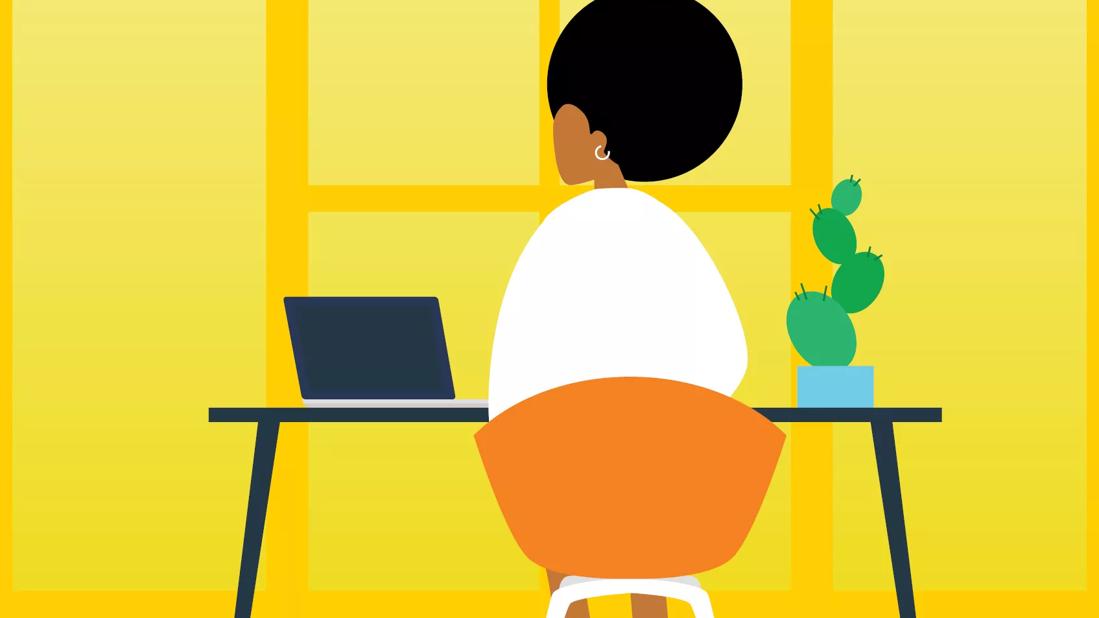Nonstop screen time can strain your eyes

Seven hours a day. That’s how much time the average person spends looking at some sort of electronic screen — and our eyes are paying the price.
Advertisement
Cleveland Clinic is a non-profit academic medical center. Advertising on our site helps support our mission. We do not endorse non-Cleveland Clinic products or services. Policy
Upwards of 90% of screen users experience eye strain known as computer vision syndrome, or CVS. It’s a reality for many in today’s technology-driven world, and can lead to symptoms such as:
Here’s the problem, though: Odds are you can’t just disconnect from screen use given job and family responsibilities. (Maybe you can eliminate a few minutes of funny cat videos, but you do need a laugh, right?)
There are ways, however, to ease eye strain. Ophthalmologist and retina specialist Rishi P. Singh, MD, recommends the following tips to keep your peepers healthy.
The angle of your gaze plays a key role in whether you experience CVS. “You’re going to be much more comfortable if you’re eyes are focused slightly downward while looking at your screen,” says Dr. Singh.
For the best angle, the center of the monitor, tablet or phone should be 20 inches to 28 inches from your eyes and 4 inches to 5 inches below eye level.
Try to avoid creating a setup where you’re swiveling your noggin, too. If you’re looking back and forth between a screen and reference materials, keep the materials where you can see them with minimal head movement.
Advertisement
Letters on a screen aren’t as clear as letters on a printed page. Glare on your screen and too little contrast between letters and background can make your eyes work harder. This results in more sensitivity to light.
The solution? “Position your screen to avoid glare from overhead lights or windows,” says Dr. Singh. “Close the blinds on your windows or switch to lower-watt bulbs in your desk lamp.”
If you can’t change the lighting to minimize glare, buy a glare filter for your screen.
Limiting eye strain when using a computer or other device for an extended period of time might be as simple as taking regular breaks. That’s where the 20-20-20 rule comes into play.
Here’s how it works: Every 20 minutes, look away from your computer and take a peek at something that’s 20 feet away for 20 seconds. “This will give your eyes a chance to refocus,” explains Dr. Singh.
And after two hours of continual computer use, rest your eyes for 15 minutes.
People normally blink about 18 times a minute during normal day-to-day activity. But computer users tend to blink about 25% as often — which increases the chance of developing dry eye.
“To reduce this risk, remind yourself to blink more often and refresh your eyes periodically with lubricating eye drops,” advises Dr. Singh.
Another tip to keep your eyes properly lubricated: Try to keep the humidity in your bedroom set at around 40% when you’re sleeping. The increased moisture in the air will decrease your risk of developing dry eye.
Uncorrected vision problems can contribute to eyestrain and musculoskeletal pain.
This includes:
If you wear glasses or contacts and need to tilt your head or lean toward the screen to see it clearly, your lens prescription may need to be adjusted. Get an eye checkup to make sure your prescription is right.
“Getting an eye checkup can help prevent pain in the neck, shoulders or back that results from contorting your body to see the screen,” says Dr. Singh.
And even if you don’t need glasses or contacts for daily activities, you may need them for computer or device use. Again, a visit to your eye doctor can help determine whether you might benefit from some specs.
Although our digital-focused society often seems to demand screen time from the moment we wake up to the second we go to bed, try to set some boundaries. Make sure to get away from the screen — especially at night.
Advertisement
Looking at your laptop or phone before you go to bed is bad for your eyes, says Dr. Singh. It can also inhibit your sleep by keeping your mind whirring longer than it should, making it harder to get a good night’s rest.
Try decreasing your screen time before you go to bed. Start by putting your phone away for 30 minutes before hitting the hay. If that goes well, consider stretching that to an hour.
“When it comes to your eye health,” says Dr. Singh, “social media and email can wait.”
Advertisement
Learn more about our editorial process.
Advertisement

Too much blue light, especially from digital sources, may lead to eye strain and computer vision syndrome

Having a first-degree biological relative with this eye condition raises your risk, but other factors are at play, too

A hostile work environment can foster a culture of aggression, doubt and negativity that’s harmful to your health and success

The differences are few, but ophthalmologists can perform eye surgeries and more complex procedures

Expect to be seeing clearly just 24 hours after LASIK surgery

Your eyes may sting or burn for a few hours after surgery — that’s why your surgeon will recommend a nap

The first three days can be tough — but easier days are ahead

Once your baby’s eyes are exposed to more light, they may start to deepen in hue or change color altogether, usually between 3 and 9 months

If you’re feeling short of breath, sleep can be tough — propping yourself up or sleeping on your side may help

If you fear the unknown or find yourself needing reassurance often, you may identify with this attachment style

If you’re looking to boost your gut health, it’s better to get fiber from whole foods